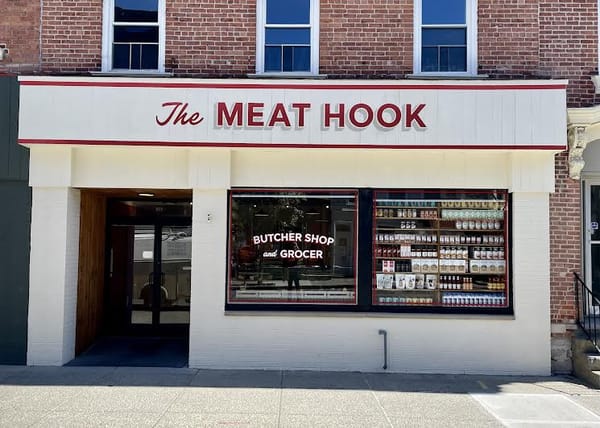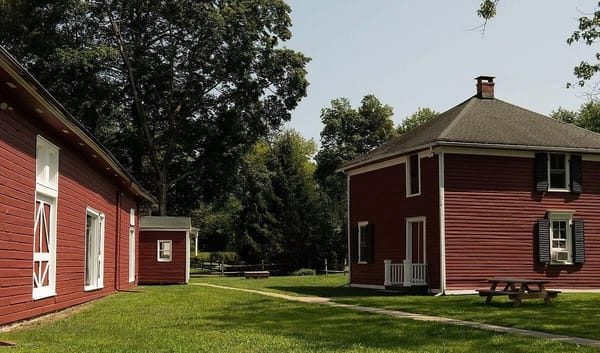
Peter Davies and Mark Scherzer are the owners of Turkana Farms in Germantown, NY. Given the tragedy that has recently befallen a local farmer (see Media Matters on the Home Page), Peter, who wrote this week's blog, was quick to point out that the following litany of complaints (written before the tragedy occurred) seems trivial. Nonetheless, it would be unfair to readers seeking the full story of the difficulties Peter and Mark have dealt with to leave these aspects of their story out. As promised, here is Part IV of the Road to Turkana Farms (but warning, this stretch of the road comes with bumps): Well, as they say: "Fools rush in where angels fear to tread." And so we did, not realizing the number of problems we would face in establishing a farm. As we should have realized, a farm cannot function as an island unto itself, but requires a particular context to survive and thrive. I guess I thought Columbia County would be that context. But when we moved here ten years ago, I was coasting on my memories of the county during the early 1970's, when I lived in Great Barrington and occasionally passed through on my way to the Hudson train station. As is usual with me, I assumed that time had stood still. It was a real jolt to realize that the county I knew in the 1970's, a largely agricultural (but poor) place, had really changed. It was my assumption, because of my outdated understanding, that finding skilled farm helpers (possibly even a farm manager) would not be a problem. In fact, one of our mentors, who usually gave as very good advice, even assured us that once we got under way, finding the help we needed would be no problem. We had visions of advertising a position, interviewing candidates, and choosing the best. Not to be. While puzzled at first by our inability to find good, hard working, knowledgeable help, we bit by bit realized, after talking with the various farmers around us, some of them from families involved in farming here for generations, that this was actually one of their greatest challenges. It seemed to be the consensus of our farmer neighbors that virtually no one these days in Columbia County is interested in farm work. And no wonder, given the ever-increasing cost of living in the county. With current house and rental prices, we have to ask ourselves, who can afford to do farm work? And until recently, there was the attraction of higher paying jobs that don't require working out in the elements. Even kids from former farm families, it seems, are not interested, probably, in part, because of their memories of the hardscrabble lives their parents endured. The American expectation of really cheap food together with the competition of large-scale industrial agriculture has had the effect of grinding down and virtually wiping out a centuries old farming culture.

Stymied in our search for help, we limped by as best we could with a string of, for the most part, sadly unmotivated teenagers, halfheartedly doing piecework. So we continued to look, putting in inquiries at the Ag Department at Cornell College and at SUNY Cobleskill across the river, offering internship positions, but we received no applicants. We left job descriptions at the placement office at Bard with the same results. How on earth, we wondered, was everyone farming around us getting by? As the farm expanded, the burden on us, given our other responsibilities, was becoming more than we could manage. From what we could see it was undocumented immigrants who seemed to be filling the farm labor void. But the draconian, ever-changing government rules about hiring such workers made us uneasy about going down that road. It was a good thing we had a good sense of humor, as for almost ten years, we have endured a dizzying array of ill-suited "helpers." Several were discovered after the fact to be on probation, two of them for acts of arson; one thought a hammer was the best way of dealing with weeds; another perversely reburied the kind of weeds that would easily regenerate as a way of ensuring more future work, and one could not work if it rained, snowed, was too cold, or if his mother didn't drive him. Apparently the farm worker version of the sunshine patriot! Finally, this past spring, only through a fluke, we happened on that rare commodity—a motivated, energetic, sincerely interested, reliable farm helper. But this was Kismet, pure and simple. In May, while taking our excess eggs to the Hudson Food Bank, I happened to mention our needs to Kathy, the director. And lo, and behold, Kathy led us to someone she happened to know, Darlene, who now works for us part time while holding down other jobs. We could, however, use one more person like her in the busy season. But, we wonder, will fate strike again? But farm help is not the only obstacle we and other farmers face. It would appear that in the past few decades almost the entire county farm infrastructure has withered away, to the point that it cannot be taken for granted that, when needed, there will be a place to take poultry and animals to slaughter. Regional slaughter facilities are few and far between, and those that are left are frequently booked solid. Though we've finally found some reasonable local choices, in some cases you practically have to book a slot the moment the animal is born. Before we found our current arrangements, we found ourselves driving our turkeys, ducks, and geese to a processing plant near Oneonta, about a 3 hour drive. And we had been forced to move to that one because the one we were using that was closer to home seemed to have ever-diminishing hygiene and undependable machinery. Once animals are slaughtered, getting satisfactory butchering done is also a constant challenge. And then there was the mysterious disappearance of a quarter of one of our 1200 pound beef cattle at a newly opened slaughterhouse up north. The slaughterhouse claimed to have put all of our beef on the truck; the trucker swore not. Apparently, as the nursery rhyme goes, part of our cow jumped over the moon. Complaints from other farmers, who feel they are not getting back their entire animals from the slaughter houses, or are getting back someone else's inferior meat, seem endemic. The lack of slaughter facilities mirrors the problems orchard owners face. Those of us in animal husbandry have to deal with the high costs, difficulties, and delays in processing our animals. apple growers are prevented from fully profiting from their harvest because there are no longer local cider mills to process their second grade apples. Even getting a full range of animal feeds, whether it be grains or hay, cannot be taken for granted, particularly if you are looking for the organic version. The Germantown Farmer's Cooperative bottomed out and closed during our second year. As an indicator of the times, Agway, once a farmer's cooperative, has now been pretty well reduced to a pet food and garden store. It no longer seems that attuned to farming needs. But all is not lost—at least, not for those who willing to struggle. Through constant searching, we have managed to cobble together sources for grain and hay, but it has been a long slog. In some cases, it takes a two hour round trip drive to get the grains we need. The lesson we've learned at Turkana Farms is that farms cannot exist as islands. It will take more than just setting aside and preserving farm land to bring sustainable agriculture back to Columbia County. The farm infrastructure must be rebuilt, something that cannot be achieved by farmers themselves. To do this would require the leadership and resources of our government.. But, we wonder, are the various levels of our government really focused on the needs of the small family farm? —Peter Davies








